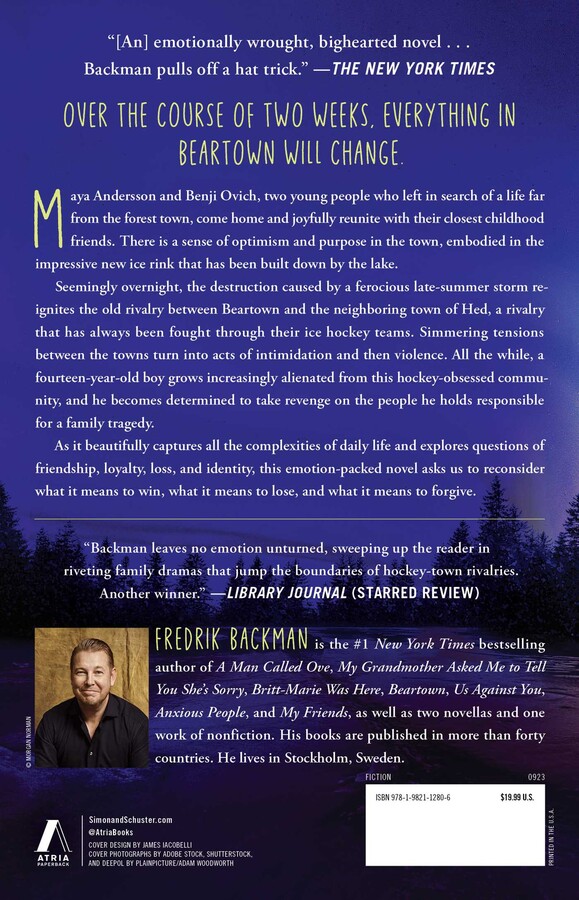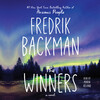Plus, receive recommendations and exclusive offers on all of your favorite books and authors from Simon & Schuster.
LIST PRICE $19.99
Get 30% off hardcovers with code MOM30, plus free shipping on orders of $40 or more. Terms apply.
Buy from Other Retailers
Table of Contents
About The Book
Over the course of two weeks, everything in Beartown will change.
Two years have passed since the events that no one wants to think about. Everyone has tried to move on, but there’s something about this place that prevents it. The destruction caused by a ferocious late-summer storm reignites the old rivalry between Beartown and the neighboring town of Hed, a rivalry which has always been fought through their ice hockey teams.
Maya Andersson and Benji Ovich, two young people who left in search of a better life, come home and joyfully reunite with their closest childhood friends. There is a new sense of optimism and purpose in the town, embodied in the impressive new ice rink that has been built down by the lake.
Maya’s parents, meanwhile, are caught up in an investigation of the hockey club’s murky finances, and Amat—once the star of the Beartown team—has lost his way after an injury and a failed attempt to get drafted into the NHL. Simmering tensions between the two towns turn into acts of intimidation and then violence. All the while, a fourteen-year-old boy grows increasingly alienated from this hockey-obsessed community and is determined to take revenge on the people he holds responsible for his beloved sister’s death. He has a pistol and a plan that will leave Beartown with a loss that is almost more that it can stand.
Discover what it means to forgive with this “hell of a conclusion to an outstanding series” (Booklist, starred review).
Appearances
Cincinnati & Hamilton County Public Library
Montgomery Bell Academy Paschall Theater
Dallas Museum of Arts -Arts & Letters Series
Cuyahoga County Public Library
Reading Group Guide
Get a FREE ebook by joining our mailing list today! Plus, receive recommendations for your next Book Club read.
Introduction
The long-awaited conclusion to the beloved Beartown Series, which follows the small hockey town’s residents as they grapple with change, pain, hope, and redemption.
Maya Andersson and Benji Ovich, two young people who left in search of a life far from the forest town, come home and joyfully reunite with their closest childhood friends. They can see how much Beartown has changed. There is a sense of optimism and purpose in the town, embodied in the impressive new ice rink that has been built down by the lake.
Two years have passed since the events that no one wants to think about. Everyone has tried to move on, but there’s something about this place that prevents it. The destruction caused by a ferocious late-summer storm reignites the old rivalry between Beartown and the neighboring town of Hed, a rivalry which has always been fought through their ice hockey teams. Maya’s parents, Peter and Kira, are caught up in an investigation of the hockey club’s murky finances, and Amat—once the star of the Beartown team—has lost his way after an injury and a failed attempt to get drafted into the NHL. Simmering tensions between the two towns turn into acts of intimidation and then violence. All the while, a fourteen-year-old boy grows increasingly alienated from this hockey-obsessed community and is determined to take revenge on the people he holds responsible for his beloved sister’s death. He has a pistol and a plan that will leave Beartown with a loss that is almost more that it can stand.
As it beautifully captures all the complexities of daily life and explores questions of friendship, loyalty, loss, and identity, this emotion-packed novel asks us to reconsider what it means to win, what it means to lose, and what it means to forgive.
Topics & Questions for Discussion
1. The Winners opens with a storm that rages across Beartown and Hed. How do different people (Ana, Hannah, Johnny, Kira, Peter, Tails, etc.) react in this extraordinary situation, what does it reveal about their characters? What are some of the unexpected things that happen as a result?
2. For the first time in years, we are told, the Beartown hockey team is better and more well-funded than the Hed team. How has their newfound superiority changed their attitudes toward their neighbors? How have the people from Hed reacted to being second best? What examples in your own life can you think of with a role reversal such as this and what were the effects?
3. Fredrik Backman chose to write about two towns obsessed with hockey and the drama that comes from their passionate feelings about the game. Are there other kinds of activities besides sports that can inspire such strong feeling of connection and personal identification in a community? If you aren’t a hockey fan, did the book still speak to you?
4. Ramona, the prickly owner of the Bearskin pub, says early in the book, “Here in the forest people are more dependent on each other than in big cities. People here are stuck together” (pg. 3). Is this true for Maya who comes back to Beartown after going to college in the big city? For Benji who leaves and comes back? Discuss among the group your own experiences or ideas about living in a small town verses a big city, do you find what Ramona says holds true?
5. Both Beartown and Hed want to win, but more than that we are told they want to watch the other town lose. How does this attitude shape the events of the novel?
6. There are a few different depictions of father/daughter relationships in the book. Are there certain common themes that connect them? How is each one unique? What does Fredrik Backman have to say about the emotional landscape of parenting?
7. Ruth and Maya grew up in Beartown around the same time, and they left home within six months of each other. They each endured a horrific sexual assault, but then their stories took very different paths. What do you think it was that allowed Maya to survive her experience while Ruth did not?
8. Over the three books in the Beartown trilogy, Amat has gone from an underdog to a champion, but in The Winners, he is faced with his biggest challenges yet. Why does Amat struggle despite all his natural talent? How does the way we handle success sometimes put us on the road to failure?
9. Backman writes of Teemu, one of the Beartown hockey hooligans, “People like him need a future, otherwise they sink” (pg. 129). How are the prospects of each town and the economic situation tied to the violent events that unfold in the novel? How does having a plan for the future help troubled youths like Teemu from sinking?
10. What is Ramona’s role with the youth of Beartown? How does she act as an unconventional parental figure in their lives? Does she remind you of any people in your own life who helped raise you who weren’t your parents?
11. Backman writes “’Marriage.’ There ought to be a different word for it once you’ve been married for enough years. When you’ve long since passed the point where it stopped feeling like a choice.” (pg. 317) What do you think Fredrik Backman means? Do you agree with this statement?
12. Lev is one of the most surprising characters in the book. In what ways did your perceptions of him change over the course of the novel? In what ways does Lev fit in perfectly with the rest of Beartown?
13. Kira’s psychologist asks her to choose if she’d rather be important or loved, and Kira refuses to answer. What do you think the real answer for Kira would be? How would you answer the question for the other characters? Yourself?
14. Backman uses the word “bang” as a motif throughout the novel. What different sounds does this word represent? How do you see the author using it for different purposes in different parts of the book?
15. The young girl Alicia is a hockey prodigy; in what ways does she represent change in Beartown? In what ways does she represent the same old Beartown?
16. The Winners asks us to consider whether everyone is deserving of forgiveness, and if someone who commits a terrible crime can be punished enough to wipe their slate clean. What do you think about these challenging questions? Has there been a time in your life when you’ve struggled with forgiving someone else? With forgiving yourself?
17. There are so many powerful and emotional moments in the book, what part of the book moved you the most?
Enhance Your Book Club
1. In the spirit of Maya’s songwriting, pick a character from the novel and write a song or poem about them to share with your book club.
2. Watch the hockey documentary “Of Miracles and Men” about the greatest upset in hockey history. Do you understand the rivalry between Hed and Beartown and their obsession with hockey better after watching? How do the themes in The Winners speak to the themes of the film?
3. Follow author Fredrik Backman on Facebook and Twitter @Backmanland or visit https://www.fredrikbackmanbooks.com/ for news about upcoming books, events, and more
Product Details
- Publisher: Atria Books (September 12, 2023)
- Length: 688 pages
- ISBN13: 9781982112806
Browse Related Books
Raves and Reviews
“Backman leaves no emotion unturned, sweeping up the reader in riveting family dramas that jump the boundaries of hockey-town rivalries. Another winner.” —Library Journal (starred review)
“Fredrik Backman is known for his engrossing page-turners, and his latest novel follows suit...A story of revenge, loss, and forgiveness.” –Woman’s World
"Beartown has been the backdrop to some of the darkest dramas of the human heart, but there are still more secrets, rivalries and resentments to contend with in this final installment." —Bookpage
"[A] dramatic and highly satisfying novel, building on themes introduced in the first two books and brilliantly drawing the reader deeply into the story. The translation is nimble and idiomatic, perfectly conveying Backman’s love of language and his wonderful sense of humor. If this really is the last Beartown novel, it’s a hell of a conclusion to an outstanding series" —Booklist, starred review
“Everything Backman’s pen touches oozes with insight and heart. The Winners is sure to be another winner.” —Amazon Book Review
Resources and Downloads
High Resolution Images
- Book Cover Image (jpg): The Winners Trade Paperback 9781982112806
- Author Photo (jpg): Fredrik Backman Morgan Norman(0.1 MB)
Any use of an author photo must include its respective photo credit

























